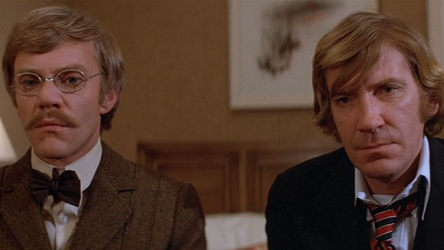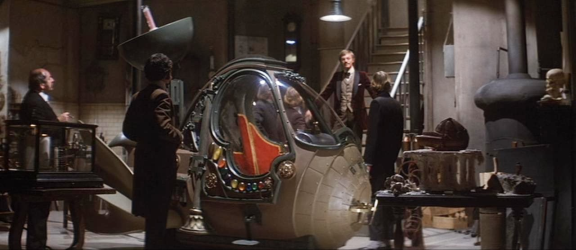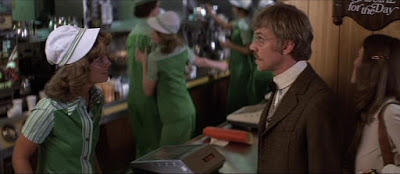If you fall, I will catch you, I will be waiting. Time after time.
That’s right! The blockbuster 1979 movie based on Cyndi Lauper’s 1983 smash-hit is…waitaminute. Well, look, it’s a time-travel movie so clearly, the producers went back in time four years anticipating the hit song or…
Time travel is confusing.

This is right before they make out.
But not here! What this movie recognizes—indeed, what most time travel movies and TV shows recognized until about the ’90s—is that time travel makes no sense, so don’t really explain it, don’t look at it too hard, it’s just a vehicle for telling an otherwise impossible story.
And what a great story to tell: In Time After Time, H.G. Wells (Malcolm McDowell) in 1893 has built a time machine which he plans to use to go to The Future, which he envisions as a utopia. (Always a big laugh from the audience, that.) Unbeknownst to him, his good friend John (David Warner, Time Bandits) is in actuality Jack The Ripper—who was the go-to slasher of the ’60s and ’70s, also featured in 1979’s Sherlock Holmes flick Murder By Decree—and he uses the machine to escape to the future of 1979! Through a number of contrivances, the machine itself returns to base unless its overridden with a key that JT Ripper didn’t have, so Herbert can then use the machine to chase after his erstwhile chess partner.
And so we have Wells and Ripper cat-and-mousing around late-disco-era San Francisco while a fiercely liberated Mary Steenburgen aggressively pursues a romantic relationship with the Victorian writer.

“Herbert, I’m practically raping you.” (You could say that back then!)
We were fortunate enough to have Nicholas Meyer and producer/hetero-life-partner Steven-Charles Jaffe on hand and they had a lot of good stories about the making of this movie. Meyer in particular seems very comfortable with talking to a crowd, and with his own artistic and life choices. (He’s basically what you want in a panel speaker: He’s got a confidence that doesn’t require him to be right or appear perfect.) One of the things he said that rang true for me as someone who has seen this movie a lot was that the movie had five aspects that reveal itself to you at different viewings: It’s a thriller, a comedy, a romance, an action flick and, finally, mordant social commentary.
I’ve seen this movie a lot, as I said, but I haven’t seen it in quite a while, so I felt like those facets really presented themselves on this re-viewing. In particular, the comedy aspects of this movie work great. It’s fish-out-of-water stuff as Wells bumbles around SFO, and McDowell is utterly charming and likable, betraying none of the psychotic tendencies of his more famous earlier roles. (And, you better believe they had to fight the studio to get him in this.) Meyer would reuse his experience (and one of the gags) in Star Trek IV.

Obligatory “wacky ’70s San Francisco clothing” shot.
The romance works really, really well, too. It’s a little shocking—frankly, it was a bit at the time, too—how aggressive Steenburgen is. Now that aggression seems archaic in its own way, but McDowell and Steenburgen were about to embark on a long romance so the chemistry positively sparks.
The thriller aspects are buoyed by the romance. The fact that we care very much what happens to our main characters gives a lot of good suspense even when (as Meyer pointed out) the crucial climactic shot is bungled. (The Ripper gets his watch-fob tangled on this steampunky doodad that comes out the machine, and this allows a last-minute escape.)
The action is very, very ’70s. Car-chase stuff, mostly. Although there’s a foot chase that’s reminiscent of The Third Man, as is The Ripper’s final gesture. This stuff doesn’t age so well, I don’t think. It’s not Bullitt or The French Connection. It’s okay, though.

A Victorian man-cave.
The mordant social commentary is actually pretty awful and, in retrospect, naive. I mean, as a kid, I thought, “Yeah, man. This is no utopia!” But as nightmarish as the World Wars were, it’s not as if wars were unknown to Brits in the late 19th century. Let us not forget that Apocalypse Now is just ’60s windows-dressing over Conrad’s Heart of Darkness. Roarke’s Drift. The American Civil War. The Napoleonic Wars were essentially the World Wars pre-enacted in a previous century.
Meanwhile, in gleaming 1979 San Francisco, you’ve got cars galore. You’ve got clean air—imagine comparing it to the air in London in 1893! You’ve got unbelievable wealth. How much poverty had Wells seen versus how much he would see in “modern” San Francisco. You’ve got computers and antibiotics and birth control—one has to wonder how that conversation would’ve gone down between Wells and his modern woman—and TV (which he’s too busy bitching about what’s on to marvel at the fact that even exists), and phones and movies and subscriber trunk dialing (as David Warner swooned over in last week’s film).
And the ’70s might have been the modern high-point (or low-point) for crime, but it was probably far better than London in the late 19th century.

One even wonders how a 19th century fellow would’ve ACTUALLY enjoyed “that Scottish place”. After all, the cheeseburger hadn’t even been invented!
Of course, this is what we thought at the time, so the reality doesn’t matter much. But it is that never gentle reminder that the current mode of thought will doubtless be as dated as the frequently-derided ’50s optimism is today. (The Reagan era reversed some of that attitude only a couple of years later, but we won’t really be free of it until the last of the post-modern, Marxist, black-propaganda of the 20th century is completely purged.)
The girls liked this film a lot. The Boy also liked it, but not as much as the rest of us, he averred.
I won a trivia question again, third week in a row. This one for identifying that a deleted scene where Wells is forced to listen to punk rock was later repurposed for Star Trek IV. So far, I’ve noticed I do the best with trivia questions that aren’t actually about the movie being exhibited.

One thought on “Time After Time (1979)”